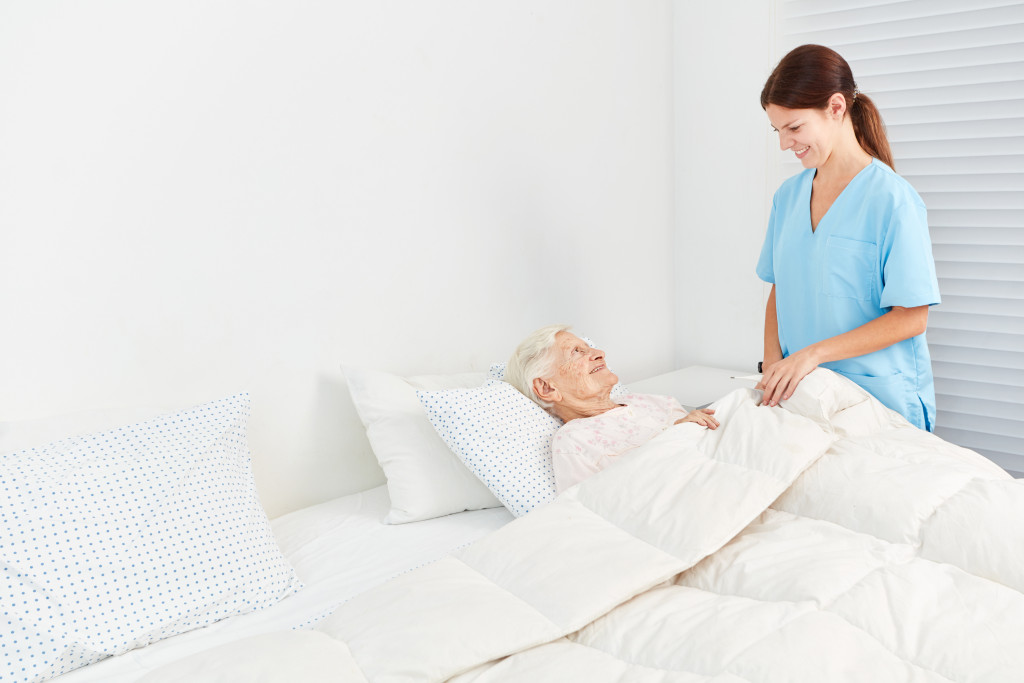People think of old age as a period when they are free of their work and personal obligations and may live a carefree existence. The reality for most elderly, however, is quite different. Just because someone has retired does not imply they are free from the challenges of life.
It may become a fight when you add severe health issues, deteriorating mobility, and chronic diseases to the mix. When a person is bedridden, things get much more difficult. They rely on family members and caretakers to provide their basic requirements.
Having a bedridden older adult at home is a huge responsibility that may be physically and emotionally draining. When caring for them the most important thing is to be affectionate. Don’t be irritated or impatient; they need your help just like you did once upon a time. Spend time with them, chat with them, and show that they are important to you.
Aside from showing care and sympathy, certain actions might help them improve their living conditions. So, here are some helpful tips for individuals caring for bedridden elderly persons at home:
1. Maintain their Personal Hygiene
For bedridden people, hygiene is very important. If the patient is unable to bathe, the attending person should assist with a sponge bath. Using a shower chair is also very convenient in such situations.
To avoid scratches, cut their fingernails and toenails regularly. Grooming boosts a person’s confidence and esteem. So, make an appointment for a haircut or shave regularly. Change their clothes frequently, and moisturizers should be used to maintain their skin smooth and free of odors.
Observe oral hygiene, and a dental kit with a toothbrush, toothpaste, a bowl of water, among other items, should be maintained by their bedside. In case of severe toothaches or any other oral problems, they will need emergency dental care service. So, make sure you have the contact of a trusted dentist.
2. Make Sure their Bed is Clean
Because the elderly spend all their time in bed, they must maintain the highest level of hygiene. Remove food stains, grime, skin particles, and other forms of soiling from bedsheets regularly.
Furthermore, place the bed in a well-ventilated area free of moisture. This has to be done because damp and gloomy environments might aid bed bug reproduction. Use cotton bed linens whenever feasible.
3. Bedsores Should be Prevented

Pressure sores which are also known as bedsores are injuries to the skin and underlying tissues. They are caused by prolonged sitting or sleeping in the same posture.
Sitting for lengthy periods exerts strain on body regions including the buttocks, legs, and thighs, causing the skin to break down and separate.
As a result, the region becomes exceedingly painful and unpleasant. In the worst-case situation, bedsores can get infected, causing serious problems that might shorten one’s life.
The good news is that bedsores are easy to avoid. Consider the following suggestions:
- Take a few minutes every few hours to reposition the person if they spend most of their time in bed. Encourage them to reposition themselves if they can move on their own.
- Check these typical locations for bedsores regularly: the heels, ankles, hips, and tailbone. The sooner a bedsore is discovered, the better the prognosis.
- Inquire with a doctor or nurse about the best method to move the patient so that neither of you sustains an injury while doing so.
4. Provide Good Nutrition
Consult their doctor or a nutritionist for advice on how to feed them a well-balanced diet. Based on their physical capabilities and nutritional needs, provide them with smaller meals throughout the day.
If they have trouble swallowing, you’ll have to chop their food into tiny pieces, puree it, or find alternative ways to supplement the nutrition, such as nutrient-rich drinks. Maintain appropriate hydration for your loved one by putting water on the bedside.
5. Give them a Sense of Purpose
Loneliness and a sense of abandonment are frequent challenges for the elderly who are bedridden. Caregivers must make their patients feel appreciated and cared for. Spend time chatting to them, learning about their interests, and making plans for them.
For instance, someone may enjoy reading, watching television, or listening to music. Yet, any stressful elements in the bedridden person’s routine, such as news of violence or crime, should be avoided.
Talk to them about their feelings, engage them in board games and hobbies, and read to them if they are unable to read on their own.
Apart from the aforementioned ideas, if any more problems in caring for aging parents or other family members at home arise, one should seek professional assistance. Because at the end of the day, it’s all about making the elderly as comfortable as possible and assisting them in receiving the treatment they need.
